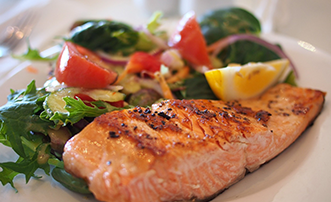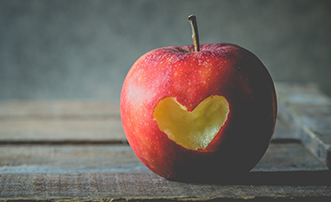Our brains are amazing, so it’s important to do amazing things for our brain! Did you know:
• Information in our brain can travel up to 268 miles per hour! Neurons are stimulated in the brain which triggers an electrical pulse that travels from cell to cell very quickly.
• It’s a myth that we only use 10% of our brains. According to neurologists, we use all of our brain and it’s even active while we are sleeping.
• The brain weighs, on average, about three pounds, but the size of our brain does not correlate with intelligence.
Here are some foods to include in your diet to be sure your brain continues to work hard for you:
Salmon
• Salmon is high in brain healthy fats called Omega-3 fatty acids. Omega-3s are very important for brain function and memory. It is recommended to eat salmon about two to three times per week to get the Omega-3s your brain and body need.
• Try baking or grilling salmon with your favorite seasonings. Add the cooked salmon to salads, rice, veggies, or serve with a refreshing mango and pineapple salsa. Salmon cakes are also a good way to incorporate Omega-3s into your meal.
• Other fish high in Omega-3 fatty acids are mackerel, herring, trout, and tuna.
Eggs
• Eggs are full of great nutrients for our brains. Choline, found in egg yolks, has been found to reduce inflammation in the brain which can increase memory. They are also high in tryptophan which is an amino acid that helps to build the “happy chemical,” serotonin. Try to eat one egg a day to benefit your brain.
• Eggs are easy to incorporate into our diets. Have them your favorite way for breakfast paired with whole grain toast and fruit. They are easy to add on top of salads, make egg salad sandwiches, or deviled eggs.
Blueberries
• Blueberries are considered to be a “superfood” because these little gems are packed with antioxidants. Flavanoids, a type of antioxidant, stimulates blood flow and oxygen to the brain to improve memory and concentration. Try adding a 1/2 cup of blueberries per day to increase brain health.
• Blueberries are great on their own but can be added to smoothies, yogurt, or a fruit salad!
Leafy Green Vegetables
• Leafy greens such as kale, spinach, and arugula are high in vitamin E, which has been shown to protect cells from damage. Vitamin K has been shown to improve memory and beta carotene has been shown to decrease cognitive decline. Try to get about two cups of leafy greens per day.
• Salads are a great way to eat leafy greens. Add yummy toppings such as grilled or baked chicken, hard boiled eggs, almonds or walnuts, tomatoes, and cucumbers. Add leafy greens to your sandwiches, wraps, soups, and pasta dishes.
Nuts
• Nuts contain many great nutritional benefits. Some of the nuts that pack the best nutritional punch are almonds, pistachios, and macadamia nuts, but walnuts are ranked the highest for their nutrition. They contain high amounts of Omega-3s and DHA, which protects against inflammation. Try to eat 1 – 2 ounces per day, or an amount that fits in your hand.
• Eat nuts as a snack or add them to salads, cereal, or yogurt.
Source: nm.org/healthbeat




